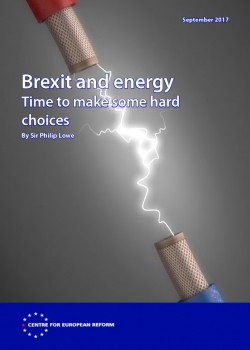
Brexit and energy: Time to make some hard choices
If Britain quits the EU’s single energy market, it will have to invest more in electricity generation, pay higher prices and accept a bigger state role in the energy sector.
- The biggest energy policy challenge facing the UK and every other EU member-state is to guarantee that supplies of low-carbon electricity are affordable for households and competitive for businesses.
- If Brexit means the UK leaving the EU’s single energy market, it will have to invest more in new electricity generating capacity, pay higher prices – arguably with less security of supply – and accept a bigger role for the state in the energy sector.
- EU energy legislation has three aims: to make it easier to trade and invest across EU borders by opening up national grids and connecting them to wider regional and intercontinental networks; to promote low-carbon energy (which means more electricity in the energy mix, and – alongside nuclear – more renewable energy); and to guarantee solidarity between member-states when one of them faces a threat to its energy supplies.
- The underlying logic of EU energy legislation is that within a bigger network, stretching across a number of countries, and including more varied sources of supply, countries will be able to economise on large investments in generating capacity and be able to deal more easily with increasing volumes of intermittent renewable energy.
- At the same time, member-states within the EU have full discretion over which energy sources can be developed on their territory, as long as they comply with their emissions reductions targets. For example, the UK has so far chosen to invest in new nuclear power stations, whereas Germany has opted to close all of its nuclear power plants.
- The aim of the single market is to remove national barriers to trade and investment and open up national markets to competition so that supply and demand, not governments, determine where electricity and gas flow. Talk of ‘having access’ to the European energy market but ‘not being part of it’ makes little sense. If the UK can switch interconnections off and on at will, it will have a separate national market. The British will be free to broker government-to-government deals, but these will have little to do with market economics.
- Neither the economics nor the politics of energy markets favour policies to ’take back control’. For example, in order to obtain better energy security, countries need to show solidarity with neighbouring countries, which implies more interdependence and governance by supranational bodies, not less.
- The UK faces a choice between economics and sovereignty. If it opts for sovereignty, there will be little or no need to co-ordinate or co-operate with the country’s European neighbours, which will satisfy eurosceptics. But if it decides in favour of continued integration in the energy field, it will benefit from more competition, less need for new generating capacity, lower prices and better energy security.
View press release here.
Sir Philip Lowe is Executive Chair of the World Energy Council’s Energy Trilemma initiative, and former Director General of Competition (2002-10) and of Energy (2010-14) at the European Commission.

